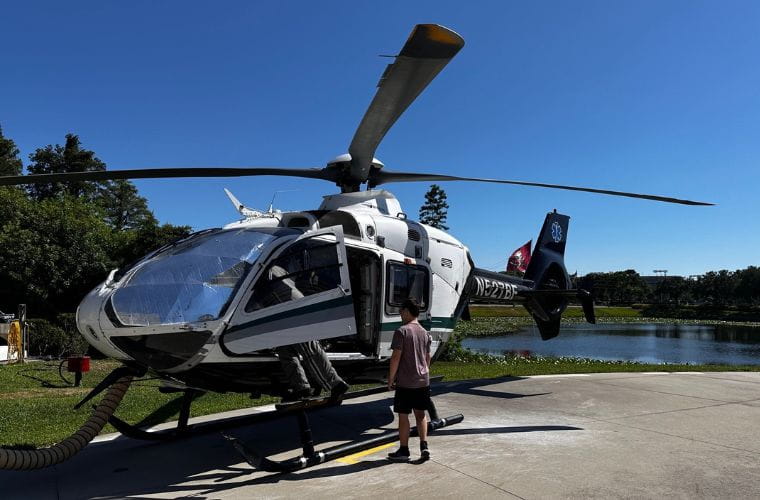Matthew Mezzei and his family are no strangers to BayCare: he was born at St. Joseph’s Women’s Hospital and after being diagnosed with Down Syndrome, he began speech, physical and occupational therapy at St. Joseph’s Pediatric Rehab. With the help of Tampa Bay’s largest provider of pediatric care, he led a relatively healthy childhood.
In May of last year, 17-year-old Mezzei came down with a case of mycoplasma pneumonia, sometimes referred to as ‘walking pneumonia.’ He was home recovering, then found himself needing the expert care of BayCare again—this time from the stroke care team.
Named among the top 10% in the nation for stroke care, BayCare’s St. Joseph’s Hospital provided Mezzei coordinated treatment to resolve a complex stroke and brain bleed. He spent seven days at St. Joseph’s and left the hospital with no neurological deficits. In addition, the team coordinated a special opportunity that will forever be remembered by Mezzei.
Mezzei’s mother, Lisa, shared the discovery of his stroke symptoms when Mezzei woke with weakness on his left side.
“He made an announcement through the echo [intercom] system to come to his bedroom. This was quite unusual and when his father and I entered his room, he was laughing but said he couldn’t get up. Now Matthew can be quite the jokester, so we weren’t sure if he was being silly.”
Mezzei’s parents took him to the nearest emergency room. After imaging scans, the neurologist and ER doctor approached his parents and told them he would be airlifted to St. Joseph’s Hospital, a DNV-certified comprehensive stroke care center. BayCare’s St. Joseph’s Hospital in Tampa and Morton Plant Hospital in Clearwater both have DNV’s Comprehensive Stroke Center Certification, demonstrating the highest level of competence for stroke treatment.
“They explained to me that I was going to be going to St. Joseph’s Hospital on a helicopter and I was excited because I had never been on a helicopter,” said Mezzei. “While we were waiting, I felt my body starting to fight something and my shoulder started twitching.”
Within minutes, Mezzei had a seizure. He was stabilized and transported by helicopter as his parents drove to meet him there.
In preparation of the transfer, St. Joseph’s Hospital began mobilizing a special stroke response team. The transferring hospital had diagnosed a blood clot in a vein that takes blood to the heart and bleeding in the space between the brain and tissues that cover the brain (a cerebral venous sinus thrombosis and subarachnoid hemorrhage).
Neuroscience nurses Melissa Lewis and Jessica Mone were on the response team and were tasked with sharing the treatment plan and updates with Mezzei’s parents.
“From the moment I walked in the room I could feel Matthew’s mother’s sorrow, but her energy was so strong. She loves her son with every ounce of her being and I could feel it,” said Lewis.
The treatment plan included a mechanical removal of the clot, also known as a thrombectomy that uses a catheter placed in a vein in the groin to be guided to the brain. Lewis explained to Lisa Mezzei that she was one of the nurses who would be in the room during the procedure and would return to the family with an update.
A few days after his procedure, he awoke to the smiling faces of his loved ones. The focus now shifted to the rehab process, as well as visits from hematology, pulmonology and neurology specialists. In a full circle moment, some members of his rehab team were the same as when he was younger. The familiarity and continuity of care was something he could depend on but there was still something else on Mezzei’s mind.
“During the rehab sessions I felt confident that I could be strong and do everything I could do before,” said Mezzei. “But I still couldn’t remember being on the helicopter and was bummed that I missed it.”
Weeks later, members of the stroke team arranged a special Bayflite tour for him. He had the chance to climb in and out of the helicopter, talk through the flight process, and was even gifted a Bayflite hat and T-shirt.
“We could not be more grateful to the staff at SJH for their dedication, diligence and humanity. We were in wonderful hands every step of the way and know they saved our son’s life. We believe we experienced a miracle,” said Lisa Mezzei.
Recognizing the stroke warning signs and getting help immediately may make the difference between a strong recovery or long-term disability, survival or death.
Learn more: BayCare’s comprehensive stroke care services
— provided by BayCare

